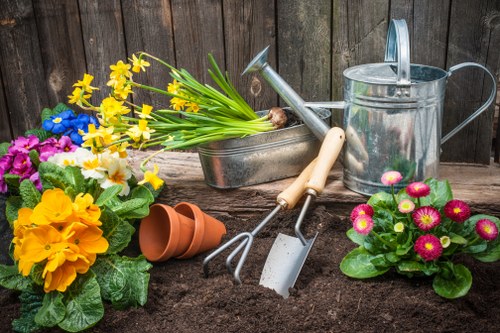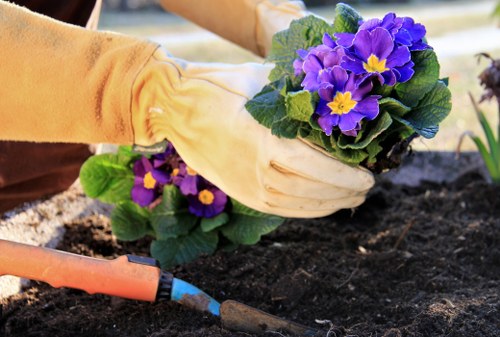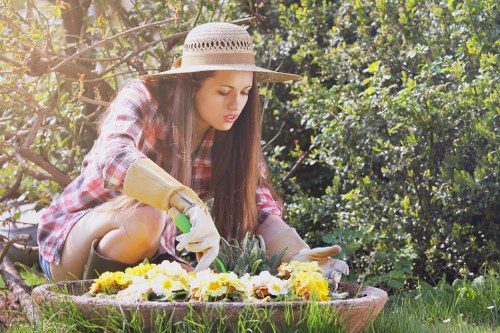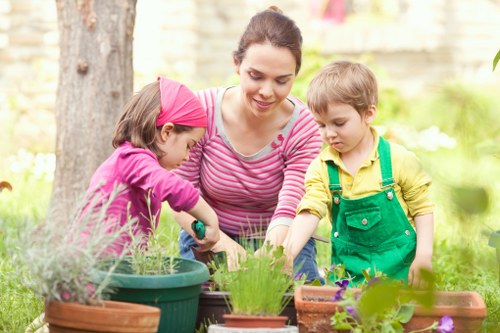Comprehensive Guide to Garden Maintenance in Leytonstone
Introduction to Garden Maintenance

Maintaining a beautiful garden in Leytonstone not only enhances the aesthetic appeal of your home but also provides a serene environment for relaxation and recreation. Whether you're a seasoned gardener or a novice, understanding the essentials of garden maintenance is crucial for achieving a vibrant and healthy outdoor space.
Garden maintenance involves a variety of tasks, from regular watering and pruning to soil health management and pest control. Proper maintenance ensures that your plants thrive, reduces the risk of diseases, and keeps your garden looking its best throughout the year.
In Leytonstone, the local climate and soil conditions play a significant role in how you approach garden maintenance. By tailoring your practices to the specific environment of Leytonstone, you can ensure that your garden remains lush and resilient against common challenges.
Seasonal Gardening in Leytonstone

Understanding the seasonal changes in Leytonstone is essential for effective garden maintenance. Each season brings its own set of tasks and challenges that require specific attention to keep your garden flourishing.
Spring Maintenance
Spring is a time of renewal and growth in the garden. Key maintenance tasks include:
- Pruning: Remove dead or damaged branches to promote healthy growth.
- Planting: Introduce new blooms and vegetables as the weather warms.
- Weeding: Clear out winter weeds to prevent them from overtaking your plants.
Summer Care
Summer brings warmth and longer days, which help plants thrive but also require diligent maintenance:
- Watering: Ensure consistent watering, especially during dry spells.
- Mulching: Apply mulch to retain soil moisture and suppress weeds.
- Pest Control: Monitor for pests and take action to protect your plants.
Autumn Preparation
As temperatures drop, prepare your garden for the winter months with these tasks:
- Leaf Removal: Clear fallen leaves to prevent fungal growth.
- Plant Protection: Shield sensitive plants from frost and cold.
- Soil Enrichment: Add compost to improve soil fertility for the next growing season.
Winter Care
Winter may seem like a dormant period, but proper maintenance can ensure your garden's resilience:
- Tool Maintenance: Clean and store gardening tools to keep them in good condition.
- Planning: Plan your garden layout and select new plants for the upcoming year.
- Snow Management: Gently remove snow from plant branches to prevent breakage.
Soil Health and Fertility

Healthy soil is the foundation of a thriving garden. In Leytonstone, soil composition can vary, so it's important to assess and amend your soil to meet the needs of your plants.
Soil Testing
Conducting a soil test helps determine the pH level and nutrient content of your garden soil. Based on the results, you can make informed decisions about amendments:
- pH Adjustment: Lime can be added to raise pH, while sulfur can lower it.
- Nutrient Addition: Incorporate organic matter like compost or well-rotted manure to enhance fertility.
- Improving Soil Structure: Adding sand or perlite can improve drainage in heavy soils.
Composting
Composting is an excellent way to recycle kitchen and garden waste into nutrient-rich fertilizer. A well-maintained compost pile can provide your garden with essential nutrients and improve soil structure.
Benefits of Composting
- Reduces Waste: Minimizes the amount of organic waste sent to landfills.
- Enhances Soil: Improves soil texture, moisture retention, and fertility.
- Promotes Healthy Plants: Provides a natural source of nutrients for plant growth.
Mulching Techniques
Mulching is a vital practice for maintaining soil health. It involves covering the soil with organic or inorganic materials to conserve moisture, suppress weeds, and regulate soil temperature.
Types of Mulch:
- Organic Mulch: Includes materials like bark, straw, and leaf mold. It decomposes over time, enriching the soil.
- Inorganic Mulch: Comprises materials like gravel, rubber, and landscape fabric. It provides long-lasting weed control but does not improve soil fertility.
Plant Selection and Care

Choosing the right plants is crucial for a sustainable and low-maintenance garden in Leytonstone. Consider factors such as climate, soil conditions, and maintenance requirements when selecting plants.
Native Plants
Native plants are well-adapted to the local climate and soil, making them resilient and easier to maintain. They also support local wildlife and contribute to biodiversity.
Seasonal Flowers
Incorporate a variety of seasonal flowers to ensure year-round color and interest in your garden:
- Spring: Tulips, daffodils, and hyacinths.
- Summer: Roses, lavender, and sunflowers.
- Autumn: Chrysanthemums, asters, and ornamental grasses.
- Winter: Hellebores, winter jasmine, and evergreen shrubs.
Vegetable Gardening
Growing your own vegetables can be both rewarding and practical. Leytonstone's climate allows for a variety of vegetables to be cultivated, including tomatoes, peppers, lettuce, and carrots.
Tips for Successful Vegetable Gardening
- Proper Spacing: Ensure adequate space between plants to promote air circulation and prevent disease.
- Regular Harvesting: Pick vegetables promptly to encourage continuous production.
- Crop Rotation: Rotate plant families each season to maintain soil health and reduce pest buildup.
Pest and Disease Management

Maintaining a healthy garden involves proactive pest and disease management. Leytonstone gardeners should adopt integrated pest management (IPM) strategies to control pests while minimizing environmental impact.
Identifying Common Pests
Common garden pests in Leytonstone include aphids, slugs, snails, and caterpillars. Recognizing the signs of infestation early can prevent significant damage.
Natural Pest Control
- Beneficial Insects: Encourage predators like ladybugs and lacewings to control pest populations.
- Handpicking: Manually remove pests from plants during the early stages of infestation.
- Barrier Methods: Use physical barriers such as nets and collars to protect plants from pests.
Disease Prevention
Diseases can spread quickly in gardens, so prevention is key:
- Proper Spacing: Ensure adequate airflow between plants to reduce humidity and prevent fungal growth.
- Sanitation: Remove and dispose of infected plant material promptly.
- Resistant Varieties: Choose plant varieties that are resistant to common diseases.
Chemical Controls
When necessary, use chemical controls responsibly:
- Selective Pesticides: Target specific pests to minimize harm to beneficial insects.
- Proper Application: Follow manufacturer instructions to ensure effective and safe use.
- Environmental Considerations: Choose eco-friendly products to reduce environmental impact.
Hardscaping and Garden Structures
Incorporating hardscaping elements and garden structures can enhance the functionality and beauty of your Leytonstone garden.
Pathways and Walkways
Creating well-defined pathways improves garden accessibility and adds visual interest. Materials such as gravel, paving stones, and decking can be used based on your garden's style.
Fencing and Boundaries
Proper fencing not only provides security and privacy but also serves as a decorative feature. Choose from a variety of materials like wood, metal, or composite to match your garden's aesthetic.
Garden Sheds and Storage
Having a designated storage space for tools and equipment keeps your garden organized and free from clutter.
Water Features
Adding water features like fountains, ponds, or birdbaths can create a soothing atmosphere and attract wildlife to your garden.
Lighting Solutions
Garden lighting enhances the beauty of your outdoor space while improving safety and usability during evening hours.
Seating Areas
Designate areas for seating and relaxation to fully enjoy your garden space. Options include benches, gazebos, and outdoor furniture sets.
Tools and Equipment for Garden Maintenance
Having the right tools and equipment is essential for efficient garden maintenance in Leytonstone.
Basic Gardening Tools
- Hand Tools: Trowels, pruners, and weeders for precise tasks.
- Power Tools: Lawn mowers, hedge trimmers, and leaf blowers for larger tasks.
- Watering Equipment: Hoses, sprinklers, and watering cans to ensure plants receive adequate moisture.
Maintenance Tips
Regularly maintain your tools to extend their lifespan and ensure optimal performance:
- Cleaning: Remove dirt and debris after each use.
- Sharpening: Keep blades sharp for effective cutting.
- Storage: Store tools in a dry, sheltered area to prevent rust and damage.
Advanced Equipment
For larger gardens, consider investing in advanced equipment like rototillers, chainsaws, and pressure washers to handle more demanding maintenance tasks.
Sustainable Gardening Practices
Adopting sustainable gardening practices in Leytonstone promotes environmental responsibility and ensures the long-term health of your garden.
Water Conservation
Implementing water-efficient techniques helps conserve this vital resource:
- Drip Irrigation: Delivers water directly to plant roots, reducing evaporation and waste.
- Rainwater Harvesting: Collect and store rainwater for garden use.
- Drought-Resistant Plants: Choose plants that require less water and are adapted to local conditions.
Organic Gardening
Emphasize natural methods to maintain garden health without synthetic chemicals:
- Natural Fertilizers: Use compost, manure, and other organic materials to enrich the soil.
- Biological Pest Control: Introduce beneficial insects to manage pest populations.
- Crop Diversity: Plant a variety of species to promote a balanced ecosystem.
Recycling and Reuse
Incorporate recycling and reuse strategies to minimize waste and reduce environmental impact:
- Repurposed Materials: Use recycled materials for garden structures and decorations.
- Composting: Turn organic waste into valuable compost for your garden.
- Upcycled Containers: Use old containers and pallets to create unique plant holders and garden features.
Energy Efficiency
Enhance energy efficiency in your garden by utilizing solar-powered lights and energy-saving irrigation systems.
Professional Garden Maintenance Services in Leytonstone
While DIY gardening can be fulfilling, professional garden maintenance services offer expertise and efficiency that can transform your outdoor space.
Benefits of Hiring Professionals
- Expert Knowledge: Professionals have the skills and experience to handle diverse gardening challenges.
- Time-Saving: Outsourcing maintenance tasks frees up your time for other activities.
- Customized Solutions: Tailored maintenance plans meet the specific needs of your garden.
Services Offered
Professional garden maintenance services in Leytonstone typically include:
- Lawn Care: Mowing, fertilizing, and aerating to maintain a healthy lawn.
- Pruning and Trimming: Shaping and maintaining shrubs, trees, and other plants.
- Planting and Landscaping: Designing and installing new plantings and garden features.
- Seasonal Cleanup: Preparing your garden for changing seasons with cleanup and maintenance tasks.
Choosing the Right Service Provider
When selecting a garden maintenance service in Leytonstone, consider the following factors:
- Experience: Look for providers with a proven track record and relevant experience.
- Reputation: Read reviews and seek recommendations from local residents.
- Services Offered: Ensure the provider offers the specific services you need.
- Pricing: Compare pricing structures to find a service that fits your budget.
Questions to Ask
- What services are included in your maintenance packages?
- Do you have insurance and necessary certifications?
- Can you provide references from past clients?
- What is your approach to sustainable gardening practices?
Maximizing the Benefits of Professional Services
To get the most out of professional garden maintenance services:
- Communicate your vision and goals clearly.
- Establish a regular maintenance schedule.
- Provide feedback to ensure your needs are being met.
DIY Garden Maintenance Tips
For those who prefer a hands-on approach, here are some practical DIY garden maintenance tips tailored for Leytonstone.
Regular Weeding
Weeds compete with your plants for nutrients and water. Regular weeding prevents them from establishing and spreading.
Efficient Watering
Water your garden early in the morning or late in the evening to reduce evaporation. Use soaker hoses or drip irrigation systems for targeted watering.
Proper Pruning
Prune your plants to remove dead or diseased branches, encourage airflow, and shape the plants for optimal growth.
Tools for Pruning
- Pruning shears
- Loppers
- Pruning saw
Soil Maintenance
Maintain soil health by regularly adding organic matter such as compost or mulch. This enhances nutrient availability and improves soil structure.
Mulching Techniques
Apply a layer of mulch around your plants to conserve moisture, suppress weeds, and regulate soil temperature.
Plant Rotation
Rotate your plants each season to prevent soil depletion and reduce the risk of pests and diseases.
Benefits of Plant Rotation
- Prevents nutrient depletion
- Reduces pest and disease buildup
- Promotes diverse plant growth
Composting at Home
Create your own compost to recycle kitchen scraps and garden waste into valuable fertilizer for your plants.
Steps to Start Composting
- Choose a compost bin location with good drainage and airflow.
- Add a mix of green (nitrogen-rich) and brown (carbon-rich) materials.
- Turn the compost regularly to aerate and speed up decomposition.
- Harvest the finished compost to enrich your garden soil.
Conclusion
Effective garden maintenance in Leytonstone requires a combination of knowledge, regular care, and the right tools. Whether you choose to maintain your garden yourself or hire professional services, investing time and effort into garden maintenance will result in a beautiful and thriving outdoor space.
Ready to transform your garden? Contact us today to book your garden maintenance service in Leytonstone and enjoy a stunning, well-maintained garden all year round.

